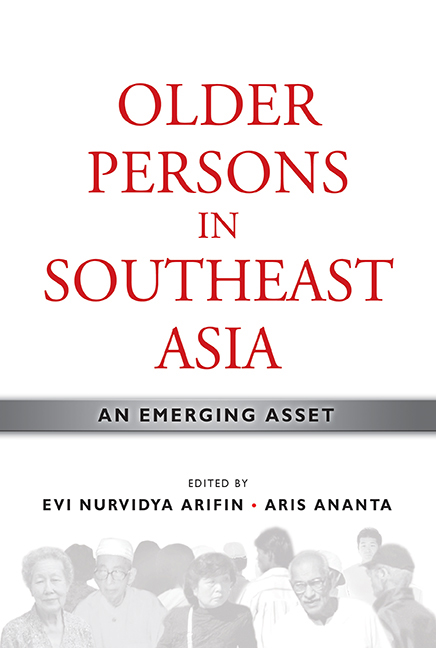Book contents
- Frontmatter
- Contents
- List of Tables
- List of Figures
- Foreword by Hal Hill
- Message from the Director
- Preface
- Contributors
- PART I INTRODUCTION
- PART II OLD-AGE INCOME SECURITY
- PART III EMPLOYMENT AND OTHER SOURCES OF FINANCIAL CONTRIBUTION
- PART IV AGEING, MIGRATION, AND DEVELOPMENT
- 11 The Nexus of Ageing and Migration in Singapore
- 12 Overseas Labour Migration and Well-being of Older Filipinos
- 13 Urbanization and the Ageing Community in Sarawak, Malaysia
- PART V ROLES OF GOVERNMENT AND CIVIL SOCIETY
- Index
12 - Overseas Labour Migration and Well-being of Older Filipinos
from PART IV - AGEING, MIGRATION, AND DEVELOPMENT
Published online by Cambridge University Press: 21 October 2015
- Frontmatter
- Contents
- List of Tables
- List of Figures
- Foreword by Hal Hill
- Message from the Director
- Preface
- Contributors
- PART I INTRODUCTION
- PART II OLD-AGE INCOME SECURITY
- PART III EMPLOYMENT AND OTHER SOURCES OF FINANCIAL CONTRIBUTION
- PART IV AGEING, MIGRATION, AND DEVELOPMENT
- 11 The Nexus of Ageing and Migration in Singapore
- 12 Overseas Labour Migration and Well-being of Older Filipinos
- 13 Urbanization and the Ageing Community in Sarawak, Malaysia
- PART V ROLES OF GOVERNMENT AND CIVIL SOCIETY
- Index
Summary
Filipinos are remarkably dispersed worldwide. This is the result of a long history of international labour migration which has been underway for several decades now. Filipino workers started finding their way to the sugar plantations of Hawaii as early as the 1920s (Morada 2001). The pattern heightened through time, particularly in the 1970s, when droves of Filipino workers were drawn by the high labour demand of the petrodollar economies in the Middle Eastern countries. The labour export was then viewed as the government' temporary solution to worsening economic problems arising from the oil crisis. However, the opening of new labour markets in other regions and the lack of sustained economic growth and continued political instability in the country made migration a viable alternative for Filipino workers. Thus the Filipino Diaspora continues to this day with approximately 8 million Filipinos or about a tenth of the country' population living and or working abroad to date.
The unabated trend of Filipino overseas labour migration has impinged significantly on the economic and social life of the country. The nonnegligible fraction of households in the Philippines having one or more members working overseas at any one time (Yang 2004) translates to millions of households who receive financial support from family members working overseas. Monthly remittances from overseas Filipino workers were officially recorded at US$1.4 billion as of March 2008, representing about 10.0 per cent of the Philippines’ GDP. This makes the Philippines the world' third highest net remittance recipient after India and Mexico (Pernia 2006). Such massive financial influx has contributed significantly to ease the unemployment situation, alleviate poverty, and help keep the country' economy afloat. No doubt the migrant workers are then considered as the country' “modern-day heroes”.
On the flipside of the remittances are the social costs of international labour migration, which among others, include the rising numbers of transnational families, or families with members located in different locations (Asis 2004). The forced family separation resulting from international labour migration has been shown to have impacted on the welfare of the family as an institution, and on the individuals, particularly young children and older persons. This is not to discount the direct costs on the migrant workers themselves, especially women who are likely to bear an emotional burden resulting from their separation from their children and spouses.
- Type
- Chapter
- Information
- Older Persons in Southeast AsiaAn Emerging Asset, pp. 314 - 334Publisher: ISEAS–Yusof Ishak InstitutePrint publication year: 2009

